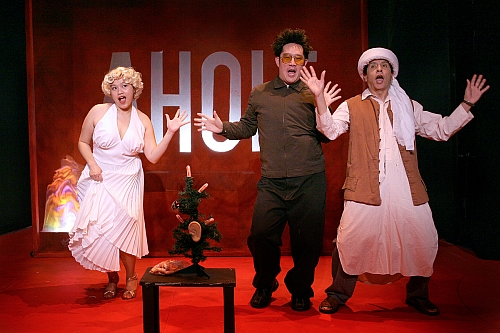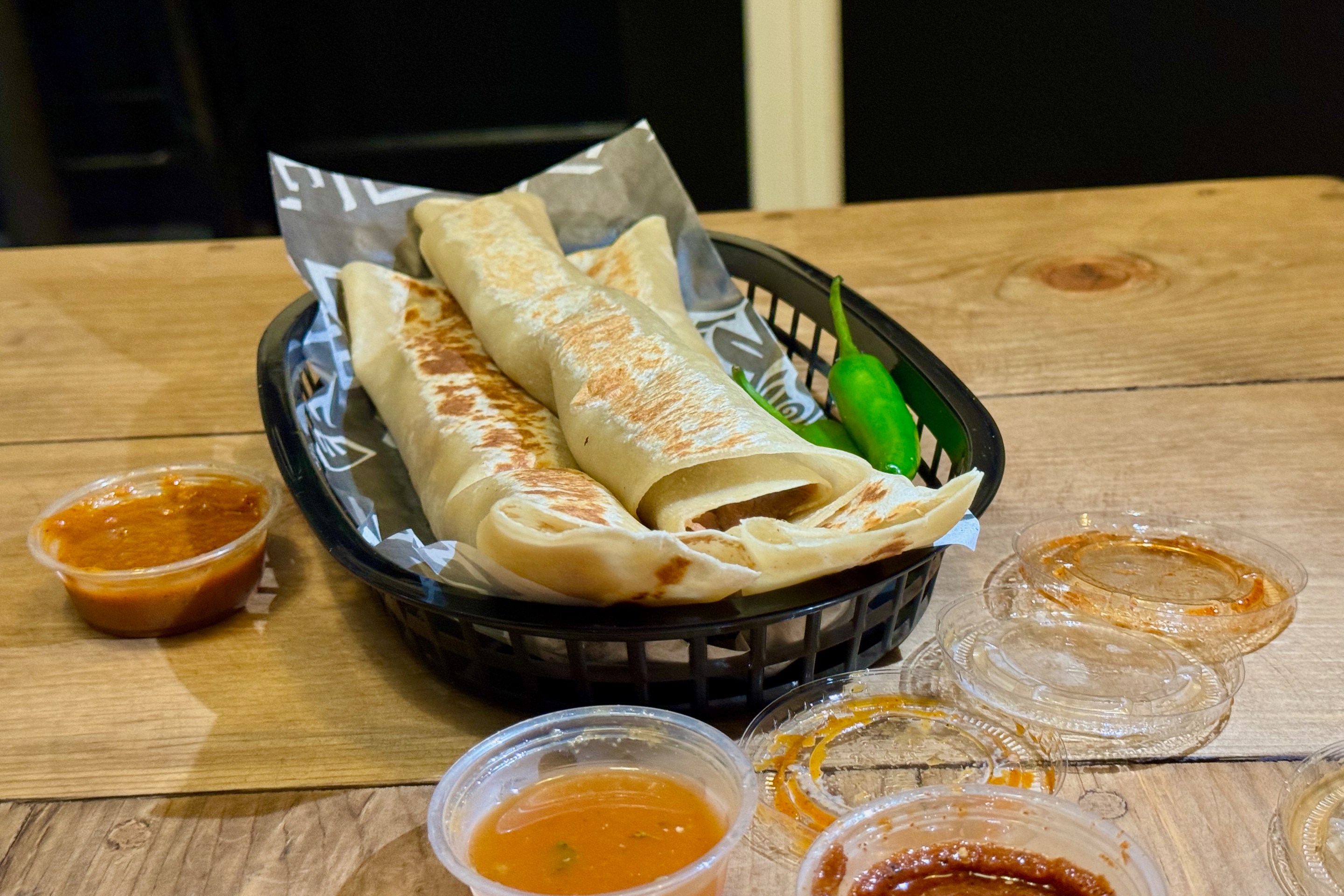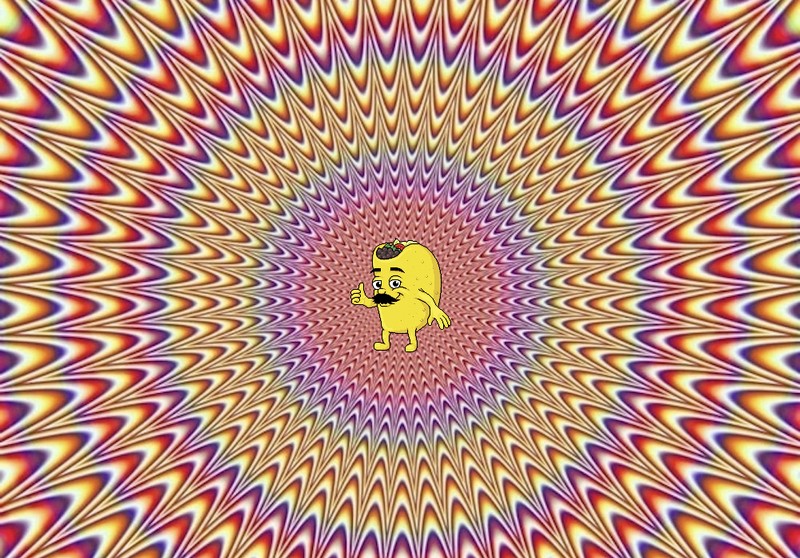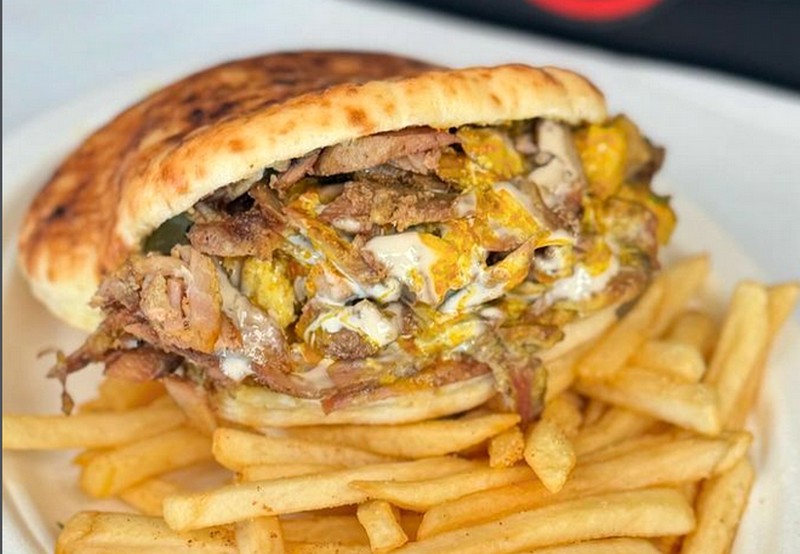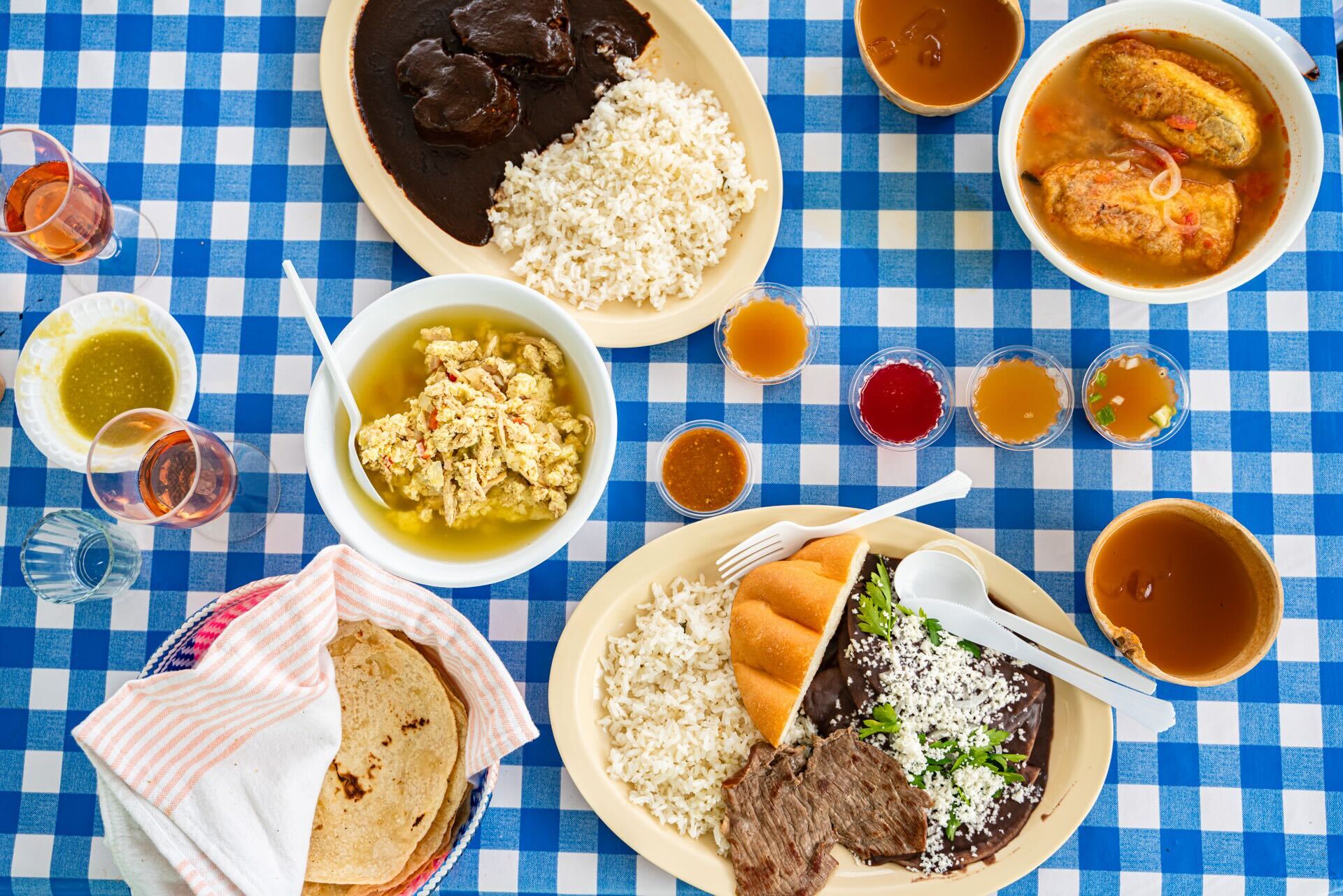
That's Marilyn Manru on the left. Photo by Shane Sato
Wanru Tseng is one of the writers/performers of the hilarious comedy of sketches TELEMONGOL which closed on Sunday at the GTC Burbank. I sat down with her last Sunday before the matinee show. I wanted to meet the creator behind the supremely confident and mischievous Dr. Pho and the actress with perfect comic timing who had me thinking I was watching Betty Boop impersonating Marilyn Monroe.
LA Taco: When did you start writing/performing?
Wanru Tseng: In 2001 I decided to sign up for an improv class and took to it right away. One of my teachers was Robert Covarrubias, a member of the multi cultural improv group Cold Tofu. In 2003 he asked me to join them. This year was the first year we were able to do a sketch collaboration with other comedy groups.
LA Taco: Let’s talk about the collaborative process. 4 groups come together, what made you decide on the subject of TV? What were you trying to say? Or change?
Wanru Tseng: Phil Cheung from Lodestone Theater Ensemble, who usually does dramatic work, wanted to do an edgy sketch comedy with social and racial commentary. So he contacted 18 Mighty Mountain Warriors who are very political, OPM who is edgy and has the race and sexual humor and Cold Tofu, where we do more general humor. 2 writers from each group threw a bunch of ideas like Charles Kim from OPM wanted to write something about the leader of North Korea and for holiday times.
LT: The Very North Korean Holiday Tour. In that sketch, Marilyn Monroe played by you, gives a gift of coal to Dear Leader, his response is “It proves there’s some left.” Can you comment on that reference?
WS: It has double meaning because at Christmas time in America if the kids are bad they get a lump of coal in their stocking. But in Korea it’s a good thing to get coal because the government squandered the coal industry with poor management. Charles wanted to show that the Korean leader tries to present his country as powerful and a leader in nuclear power but in reality it’s very poor and the people are starving.
LT: In THE DR. PHO SHOW, which you wrote, you highlight another Asian country who has known many hardships by embodying the outspoken and unapologetic DR. PHO.
WT: I come from Taiwan. I was nervous about doing a Vietnamese character in front of Vietnamese Americans because it’s very different for an actor of one race to portray someone from another race, I don’t want to look like I’m mocking. Even the title is like calling someone Dr. McDonald or Dr. Burger King. (Pho--a traditional rice noodle soup—is a staple of Vietnamese cuisine)
LT: But Dr Pho is strong, smart, witty and sexy. She comes off as being very powerful.
WT: Vietnamese people have endured lots of horrible things in immigrating to the US, being refugees, but they’re a strong group of people who can make a lot out of nothing. Dr Phil, a straight talking guy, has a show where he gives advice, that’s how I came up with her. Whatever problems you may have it is nothing compared to what she’s been through. Whatever you say, she has a way of topping you.
LT: Like when the guy complains of having lots of phone calls to make at work and she replies: “Oh it’s hard? Have you ever had to hang off the landing gear of a 747 hut? Now that’s hard!”
WT: That’s a reference to the images of the Vietnamese people trying to jam on to the airplanes the day before the fall of Saigon. Then the humor gets darker with the rape. Her philosophy is “It’s so sad, if you don’t laugh, you’ll cry”. So you laugh about it and you become stronger.
LT: Did people from Dr. Pho’s generation come to see the show?
WT: I got to meet people of all ages who have all seen or known a woman like Dr Pho. They had positive responses. One person said: “That’s my aunt.”

L to R: Michael C. Palma, Jully Lee, Denise Iketani, Aaron Takahashi, Wanru Tseng. Photo by Shane Sato
LT: In DESPERATE ASIANS OF LOTUS LANE, the other sketch which you wrote, Denise Iketani plays a jogger sporting a visor that entirely covers her face. The idea was that she doesn’t want her skin to get darker.
WT: I live in San Gabriel, it’s a predominantly Asian American community, there are ladies who wear that every day just walking around, driving in their car and it covers their whole face. When they drive they also wear little white sleeves over their hands so even their hands don’t get dark. It’s a trend that came over from Asia. The fairer you are, the more desirable. In Asia they have a huge market for whitening cream, girls who have fair skin apply it to look ghostly starkly white.
LT: Do you know the origin of that trend?
WT: I have no idea, I don’t know of one Asian culture where having a fair skin isn’t more prized. I think it’s probably working class vs. noble or elite class. We’re so far removed now but somehow it’s still there.
LT: Growing up in France, my education in American culture came mainly from TV shows and movies. When I moved to Los Angeles I didn’t recognize the American world I had been introduced to in my childhood. It’s such an amazingly diverse country but this richness doesn’t cross over into the TV and film world. Do you feel that the Asian American culture is included?
WT: People feel that we still have a way to go to truly represent more than one dimensional version of what being Asian American is. We’re getting so few leading roles. You see them very quickly like a Chinese restaurant worker or an immigrant fresh off the boat and they barely speak English. In the show “Lost”, which is on ABC, two of the characters are a Korean couple who spoke only Korean for a whole year. Asians are still portrayed as foreigners or immigrants to the US.
LT: At the beginning of every new TV season, I like to watch the billboards while driving around LA. Every year it’s the same thing, the ads for the new shows always show two White people in the foreground and then one African American…
WT: Behind and to the left. (laughs)
LT: Right! And you’ll probably see a brown face on there too. It seems to me that whoever complains the most gets to be represented. Like African Americans are great at asking for what they want. After the Michael Richards incident, representatives of the NAACP made a statement of condemnation on prime time TV and Michael Richards placed phone calls to the Reverends Jesse Jackson and Al Sharpton to apologize for his behavior.
WT: The most effective way to represent your culture or race is to be the best at what you do. We don’t always need to be so literal all the time and say “We need to be represented!” CBS has a multi cultural development office today. I think every network is trying to foster new talent. If you put someone up because it fits a quota or because it is multi-cultural and the show fails because it wasn’t quality, it makes the situation even worse. But I know a lot of actors in my group who are more experienced and would say “It’s hard! We need more roles!”
Masi Oka is on a show called “Heroes” on NBC right now which has a very diverse cast. He portrays a Japanese man who comes to the US. At first it was disheartening because it was another Asian American with an accent portraying a business man. But because he’s a great actor and people really relate to the character, they are writing more and more material for him and his character is evolving quite a lot. That’s exactly what we must do as actors in general. Whatever you do, do it the best you can. I hate to say it but 20 years ago there would be no Asian American man in a diverse show. In the last five years or ten years changes have been made. Every major network is trying to broaden like ABC with “Ugly Betty” a show about a young woman whose family comes from Guadalajara.
LT: I agree with you that what we need is not quota,s but historically progress doesn’t happen from the top, it happens because people who feel excluded stand up for their rights.
WT: I watched the movie “The Slanted Screen”. It’s about Asian American men on film. You think Asian American actresses have it hard, but the men have it worse, they always play the gangster or the emasculated man in the sense that they never get the girl, the White leading man always does. One actor was talking about being cast as a geologist in “Dante’s Peak.” He wasn’t a Chinese restaurant owner or business man, it wasn’t about race. He was just a geologist among a group of other geologists and he loved it. I see commercials changing too. Aaron Takahashi, who’s also in Telemongol, just got a commercial where he’s an office guy and he got it because he was the best at it.
LT: The stereotype that comes back again and again in Telemongol is that White people think of Asian Americans as docile or unobtrusive. It brings to my mind the story of Fred Korametsu, a Japanese American man who sued the government for violation of his constitutional rights and racial discrimination during World War II following his internment. In the PBS documentary “Of Rights and Wrongs,” it was suggested that he felt criticized by his community for making waves and bringing unwanted attention to them. So is it stereotype or truth? Not to suggest the Japanese American experience automatically relates to the Korean or Vietnamese American experience...
WT: Right in Asia I don’t think anybody would say “Hey we’re all Asians.” But in the United States we do feel we have the same sensibility.
LT: My point is if Michael Richards had used the word Chink instead of the N word, do you think we would have seen the same response?
WT: I’m not sure why we’re less vocal, I don’t know if it’s cultural. There is a different focus. The Asian American focuses on work, making a living, sending the kids to school. Anything artistic or creative is seen as extraneous. Docile? I don’t know, but maybe not as active. Asians are so strong at developing business, commerce, our community has grown so much, we have community centers, but they’re not trying to get people to vote, politically they’re not strong, but things change.
Actually Sarah Silverman used the work 'Chink' in a joke on Late Night with Conan O’Brien and for a while there was a large vocal uprising from the Asian community because using Chink is like using the N word. Had she used the N word she probably wouldn’t have a career anymore, but she continues to get cast.
LT: Okay. So, what’s wrong with Filipinos?
WT: (laughs!) Nothing.
LT: Because in Telemongol they’re either portrayed, with a smile of course, as “not Oriental enough,” or mistaken for Mexicans. Do people not consider Filipinos Asians, for whatever reasons, are they associated with the Latino community, maybe because of the “ino” at the end?
WT: They were colonized by Spain for a long time but truly they are as equal part Asian as they are American. A lot of them speak Chinese because they immigrate to China for work, to be home care providers, custodians, but they also speak English because of the US occupation and overwhelming influence.
LT: In your show, it feels like they’re portrayed as the Black sheep of Asian America.
WT: I don’t think that’s how other Asians feel… maybe it came out that way because we don’t have a Philippino writer on the staff!
LT: What’s the ethnic make up of your audience? When I saw the show it was me and a couple of other Caucasians in a predominantly Asian American crowd. Did the very favorable review in the LA Times bring a more diverse audience?
WT: I would love to see a more diverse audience. We don’t write for just one race but we happen to know about our own cultures more. We have some jokes that are for the community like when Charles stabs himself and say a lot of things in Korean, the Korean people in the audience almost die laughing, I don’t understand Korean, but I still think it’s funny.
LT: I agree, I didn’t understand what he was saying but he was hysterical. I enjoyed laughing at the jokes I didn’t get – which were few – as much as I enjoyed watching the audience laugh at the jokes I didn’t get. People are flocking to the movies to see “Borat” about a fake journalist from Kazakhstan; I wish they would be as eager to be entertained by their own neighbors.
WT: My co-workers from USC are coming today, they’re like the United Nations, there’s a Swedish guy, two Italian, one Chinese.
What is interesting in the LA Times review is that he didn’t begin by saying it was an Asian American group, it was just more general and about the story.
We just want to write what we know and what we think is funny and we want to perform. Where would I get to play Marilyn Monroe except in an Asian American theater? It’s the first time I was able to showcase that. One week I played Angelina Jolie in a news segment. Where else would have I a chance to dress like and attempt to portray a Caucasian? The great thing about this opportunity is also to perform material people don’t usually associate with Asian Americans, which is comedy. They might be familiar with Asian American theater, but sketch comedy…that’s totally foreign.
Working collaboratively was a great experience. The Asian American theater community is very small, and we’ve always been supportive of each other. I always admired Greg Watanabe from 18 Mighty Mountain Warriors and Charles Kim of OPM. I’m so grateful I had a chance to work with them and Henry Chan, our director, if you look at his resume; he’s such a well experienced director. Working together made our bond stronger and now it feels easy to reach out if we want to collaborate. Everyone contributed equally. The support was phenomenal. As minorities, maybe that’s what also makes us bond but fundamentally we are all American.
LT: So off the subject of Pho, what about tacos?
WS: I work at USC Health Sciences Campus which is just East of downtown LA. Therefore I am well-experienced in taco stands and, of course, the taco truck. Luckily, I have a stomach of iron and, hence, can freely enjoy all their greasy goodness. My favorite taco, hands down, is carnitas. Taiwanese and chinese people love pork. The history of this love affair is too lengthy to go into here but needless to say, I, too, am a fan. Although King Taco and other such chains are good, the best carnitas taco I ever had was bought by my coworker. She went to some non-descript hole-in-the-wall where they sell cooked meats by the pound. They also provide thick, chewy tortillas, salsa, cabbage, radishes and lemon. I don't know the exact location, but I'll ferret it out someday.
LT: Where do you recommend eating in San Gabriel Valley?
WS: I've grown up in the San Gabriel Valley almost all of my life and I still have not tried all the Asian restaurants in my area. I think it's nearly impossible. I will recommend a plaza that contains two outstanding Vietnamese restaurants. The first is "Golden Deli" which specializes in pho and other typical Vietnamese dishes. It's considered very authentic among Vietnamese-Americans and is even highly rated by Zagat. Right next to "Golden Deli" is "Newport Seafood" a sit-down, family style restaurant. Newport specializes in Vietnamese/Chinese fusion. The seafood, like crab and lobster, are a must-try. But their "French-Style" beef is also a specialty and incredibly delicious. Both restaurants are located in a plaza at the intersection of Mission Dr. and Las Tunas Blvd. in San Gabriel. You will know that you're at the right place when you see people lined up and cars backed up in the parking lot. Try street parking in a pinch.
LT: So finally, is there anything you recommend people doing in Los Angeles? Any secret spots?
WS: I don't think I'm very different from most Angelenos. I think most people already know about the museums, the easy access to the mountains or the beach and, of course, the great food. However, I do think I probably watch more theatre and live performances than other people. Local theatre can be pretty good and cheap (look for matinees), but mostly, I watch improv. I recommend ACME comedy theatre on La Brea which has on-going, serial, improvised shows and, of course, Cold Tofu Improv which has shows every month for only $5! Cold Tofu is based in little Tokyo so before the show you can explore local shops, restaurants and the tranquil Japanese American National Museum.
Thanks Wanru!!
Stay in touch
Sign up for our free newsletter
More from L.A. TACO
Juárez-Style Burritos Have Arrived in Southern California, And They are Already Selling Out In Less than An Hour
The month-old strip mall taquería in Anaheim make all their flour tortillas from scratch using both lard and butter, resulting in an extremely tender vehicle for their juicy guisados like carne en su jugo, carne deshebrada, chile colorado, chile relleno, and chicharrón. Every tortilla is cooked to order, too.
Urgent: L.A. TACO Falling Short of Fundraising Goals and Needs Your Support
Emergency. This is not a test. This is not a ruse. This is not a marketing scheme. We need your support if we're going to make it and every single membership counts.
What To Eat In L.A. This Weekend: Mexican-Style Pastrami, ‘Trashburgers,’ and Flamin’ Jim Morrisons
Plus, a new shawarma spot in Tarzana and the country's first wine festival dedicated solely to orange "skin contact" wine happening in Hollywood.
The 11 Best Backyard Restaurants in Los Angeles
Despite many requests to publish this guide, L.A. TACO has been somewhat protective of these gems to not "burn out the spots." However, we wanted to share it with our small, loyal pool of paid members, as we appreciate your support (and know you to be okay, non-NARCs). Please enjoy responsibly and keep these 'hood secrets...secrets.
Here’s What an L.A. TACO Membership Gets You and Why You Should Support Local Journalism
With more than 30 members-only perks at the best L.A. restaurants, breweries, and dispensaries waiting to be unlocked, the L.A. TACO membership pays for itself!
